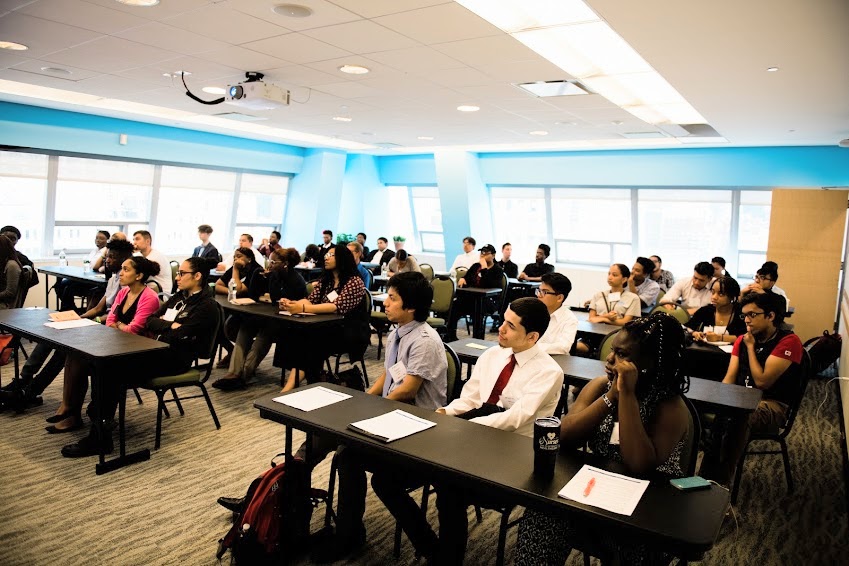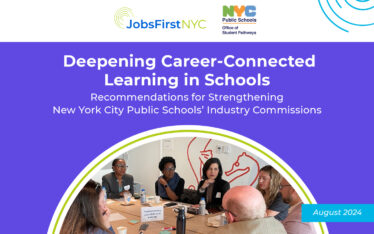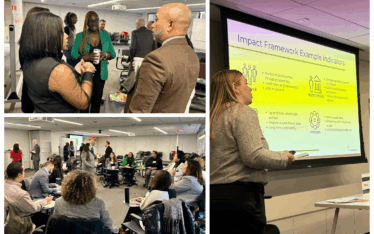In the wake of the Great Recession, a strong economy made it easier for young adults to find jobs, leading to significant declines in the number and share of New Yorkers aged 18 to 24 who were out of school and out of work from 22 percent (187,588 young adults) in 2010, to 16 percent (113,000) in 2018.
While exposing, exploiting, and expanding every inequity our country is confronting, the COVID-19 pandemic has also eroded all of these education and employment gains. The Aspen Institute now estimates that at least 27 percent (259,000) and possibly as many as 34 percent (324,000) of 16- to 24-year olds are out of school and out of work in New York City, and nearly 3 in 10 nationally. This rate is even higher in neighborhoods harmed by divestment and other long-standing injustices, some of which JobsFirstNYC’s efforts are focused on.
In the face of new unimaginable challenges, JobsFirstNYC sees great opportunity for progress. Offering solutions to correct structural imbalances and build more equitable systems for an inclusive recovery, the second installment of this year’s Adapting to the Future of Work event series featured community-led solutions to economic mobility—localized solutions that respond to the unique needs of neighborhoods and the people who live in them.
Marjorie Parker, President and CEO of JobsFirstNYC, began the program, sharing reflections on JobsFirstNYC’s origin and mission of reducing New York City’s then record-high number of out-of-school, out-of-work young adults. Marjorie described this event’s focus on solutions that harness the power of communities as changemakers—by the people, for the people. Emphasizing that, with the impact of COVID-19 on young adult employment, social and economic transformation is even more critical now, Marjorie also highlighted that, “While the economic success of a young adult is determined by numerous factors, JobsFirstNYC believes solutions should be sourced from diverse perspectives and experiences.”
Presenting national perspectives, Lori Boozer, Senior Program Officer of Mobility LABs at Robin Hood; Fay Hanleybrown, Managing Director at FSG; and Monique Miles, Vice President at The Aspen Institute, then dove into a conversation featuring collaborative partnership approaches to economic solutions, moderated by LeAnne Bennett, the Vice Chair of JobsFirstNYC’s Board of Directors, and Managing Director and Head of Executive & Management Development at JPMorgan Chase & Co. Monique and Lori each shared their experiences being a part of large-scale community-led initiatives—Opportunity Youth Forum and Mobility LABs respectively—making clear that unequal systems, including education, workforce, healthcare, and others, were built intentionally, and deconstructing them requires the same intentionality. Fay described FSG’s collective impact approach and research showing that collaboration leads to systems change and population-level outcomes. Fay also noted that not only are communities with cross-system, cross-sector collaboratives in place better positioned to respond to crises, but these types of partnerships also provide a foundation to reconstruct systems that are more equitable. All speakers acknowledged the importance of centering the voices and needs of community members to allow them to drive the work from the ground up, building holistic approaches to sustain people out of poverty.
Monique: “Communities that have collaborative infrastructure and capacity are able to respond in real-time to some of the most pressing challenges that they face. They are more resilient and able to pivot and shift their strategies to respond to crises like COVID-19.”
Lori, in preparing for the event shared: “The world outside of Brownsville didn’t see us the way we saw ourselves. We were not heard. And oftentimes the narrative told to us was one of needing to escape a bad community and lose this part of your identity. But all of that fueled me… We can own who we are and our experiences on our journey to mobility and we have lived experience that we can and should bring to these conversations as we advocate for others still experiencing poverty to be elevated in the conversation as experts. Now is the time to fight with—side by side—and even putting those of us no matter how small our modicum of privilege, at the rear. As black people, we’ve had our names stolen, our language changed, our history rewritten to the extent that we sometimes lose sight of our greatness as a people. This moment of collective action and movement building is a reminder of who we are and what can be done when more seats are added to the table, and even better, when we are leading the conversation.”
Fay: “The collaboratives that are really successful at shifting systems are explicit about shifting systems, and that means that they are also shifting policy, they’re lifting up the voices of community and shifting power dynamics, and they are shifting mental models and narratives as well, while centering equity.”
Next, leaders from local place-based partnerships powered by JobsFirstNYC, Brittany Bellinger, Program Manager at Youth Design Center, and lead partner of Brownsville Mobility LABs; Kerry McLean, Vice President of Community Development at WHEDco, and a steering committee member of the Jerome Avenue Revitalization Collaboration; Kelly LoBianco, Chief Program Officer at The HOPE Program, and Co-Chair of YES Bed Stuy; Brian Licata, Membership Relations Manager at the Staten Island Chamber of Commerce, and Chair Emeritus of Youth WINS; and Gaspar Caro, Partnership Director of the Lower East Side Employment Network; were introduced by Roman Jackson, Vice President of Partnership and Economic Opportunity at JobsFirstNYC. Each described their partnership and its purpose, the community conditions driving that direction, and their approach to achieving it. A theme that resonated across the panel, and throughout the event, is that real and lasting community-level improvement requires multi-stakeholder collaboration—residents, employers, businesses, government, nonprofits—and first-hand knowledge of the issues, which aren’t always seen clearly looking from the outside in. Some also noted that properly supported, civically-engaged young people can be powerful agents of change for their communities.
Brittany: “To address the needs of a community like Brownsville, we [Mobility LABs partners] have taken on this community engagement approach in order to develop new solutions that are both data-driven and heart-led by the residents.”
Kerry: “The JARC collaborative is enabling us to think together about how to center equity and economic opportunity for those who live in the neighborhood to benefit from new opportunities in the neighborhood.”
Kelly: “We [our community] were eager to be a part of a place-based strategy that leveraged the critical mass of partners and resources to meet a great local need and hopefully upend systems of inequity.”
Brian: “Partnerships are hard—there is a real cost for this work—and typically not well funded. Funders have pitted organizations against each other, where outcomes are based on how well you do compared to other agencies.”
Gaspar: “There are tremendous returns for partnership. In pooling your resources you can spark efficiencies, enhancements… ultimately it ends up making each element and each piece better.”
At the helm of a community-led effort to create local wealth and ownership, Michael Partis, Executive Director of the Bronx Cooperative Development Initiative (BCDI), interviewed by Marjorie Parker, brought a unique perspective to round out the community-solutions conversations. Taking an asset-based approach to push for change in decision-making structures, BCDI supports the community to make and advance the plans for local ownership and wealth-building that decrease generational poverty and increase mobility. This shared wealth and power is what BCDI refers to as economic democracy.
Michael: “What if we owned it, what if we controlled it… What would change?… What would it look like if the Bronx GDP (~$42 billion) were controlled by the majority of residents (90% Bronxites of color)?”
Post-2008, the economic recovery was not an inclusive one, exacerbating both income and wealth inequality, and widening racial disparities in employment outcomes for 18- to 24-year-olds. Rates of unemployed Black and Brown young adults reached more than twice that of white young adults. Federal bailout packages rescued big banks, yet left out working Americans—completely ignoring the next generation of our workforce.
Now, as the government debates over the next stimulus package, at the same time the nation grapples with the triple crisis of the pandemic, the economic crisis, and the reckoning with racism in America, we must learn from past mistakes and ensure that the needs of young people and all who serve them are met.
Throughout the Adapting to the Future of Work event, we were again reminded that in the face of so much uncertainty, we can rebuild more inclusive and just systems by harnessing the power of diverse collaborations, community members, and young adults. That is why JobsFirstNYC is calling for increased investment in community economics. Multi-stakeholder place-based approaches that include community-based and young-adult-serving organizations can play a critical role in designing more equitable large-scale solutions to improve the lives of young people, their families, and their neighborhoods.
Thank you to all who participated, and to the supporters of our efforts to advance social and economic mobility solutions.




